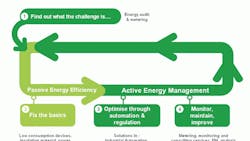Industry uses approximately one-third of the energy consumed in the United States, according to the U.S. Department of Energy, at a cost of more than $100 billion a year. Energy-intensive industries such as chemicals, petroleum refining and primary metals represent 83% of all manufacturing energy use. While energy management programs are in place at many companies in an effort to reduce energy consumption and costs, these programs often are focused on individual projects or programs. Typical plant projects involve switching to more efficient lighting or updating HVAC systems.
But energy experts such as Deloitte Consulting Principal Dave Fornari say it is time for companies to take a more strategic approach to energy management. He says plant initiatives fail to provide companies with a "consistent, comprehensive view of how energy and resources impact the business model." As a result, says Fornari, who leads Deloitte's federal energy and resources management practice, companies may have difficulty allocating capital improvement funds for energy management in a way that provides the greatest return on investment.
The changing picture in energy supply is another key driver for more focus on energy management. Aging coal plants with some 30 GW to 50 GW of capacity will likely be retired in the next decade, according to ICF International, due to either outdated equipment or environmental rules. "When you take very efficient and cheap coal plants offline and replace them with higher-cost renewable energy or build cleaner plants with natural gas, you are going to increase the cost of energy in your state," notes Fornari. He expects that, depending on the region they operate in, companies could see energy prices increase 20% to 40% over the next 10 to 15 years.
Companies also need to consider energy from a risk-management standpoint. "In mature economies, we tend to think of energy, whether it is water, electricity or gas, as if it will always be in abundant supply," says Greg Bodenhamer, vice president, Industry End User Solutions & Services, Schneider Electric. But disruptions to energy supply are a real possibility, he says, and argue for manufacturers becoming more efficient consumers of energy. He notes that for every unit of energy consumed at the point of use, three units must be produced upstream because of inherent inefficiencies in generation, transmission and distribution. "If you want to become very efficient, save it at the point of use," Bodenhamer says.
Some major companies have started to put more executive focus on energy management. At Alcoa Inc., Rick Bowen, president of Alcoa Energy, is responsible for overseeing the company's overall energy strategy and reports to CEO Klaus Kleinfeld. Alcoa joined DOE's Save Energy Now leader initiative in 2010 and has committed to reducing the energy intensity of its manufacturing operations other than aluminum smelting in the United States by 25% by 2020. Alcoa formed a Global Energy Efficiency Team to coordinate energy efficiency activities across the company and share best practices. Last year, Alcoa also began linking leadership performance pay to achieving incremental energy-efficiency targets.
Nearly a decade ago, the company's CEO established a program called the Energy Efficiency Network to audit facilities and provide local management with potential energy efficiency targets. That program identified over $100 million in potential energy savings.
Bodenhamer says it is critical for companies to get executive leadership involved in energy management, establish accountability throughout the organization and develop a culture where energy is seen as a variable cost that managers can impact.
"Industrial manufacturers have not thought about energy consumption as a per unit expense. It has typically been some fixed cost overhead that just gets allocated to production lines in a plant," he observed. "Leadership has to drive home the idea that it is not a fixed cost that individual plant or line managers have no control over."
About the Author
Steve Minter
Steve Minter, Executive Editor
Focus: Leadership, Global Economy, Energy
Call: 216-931-9281
Follow on Twitter: @SgMinterIW
An award-winning editor, Executive Editor Steve Minter covers leadership, global economic and trade issues and energy, tackling subject matter ranging from CEO profiles and leadership theories to economic trends and energy policy. As well, he supervises content development for editorial products including the magazine, IndustryWeek.com, research and information products, and conferences.
Before joining the IW staff, Steve was publisher and editorial director of Penton Media’s EHS Today, where he was instrumental in the development of the Champions of Safety and America’s Safest Companies recognition programs.
Steve received his B.A. in English from Oberlin College. He is married and has two adult children.
